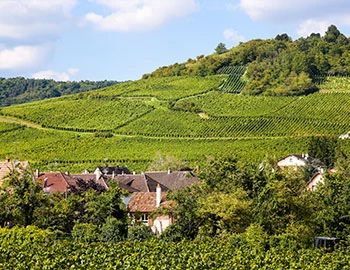Alsace Riquewihr 2020
AC Village Alsace, Domaine Marcel Deiss, 750 ml

| Grape variety: | Pinot gris, Riesling |
| Producer: | Domaine Marcel Deiss |
| Origin: | France / Alsace |
| Other vintages: |
Description
The Riquewihr is a capricious cuvée of Riesling and Pinot Gris that is sometimes crisply fresh and light-footed and then again a little more serious and straightforward. Domaine Deiss is a "superstar" of the Alsace winegrowing region and is run biodynamically by Mathieu Deiss with the help of his father Jean-Michel. This white wine exudes a lush aroma of pear, peach, citrus fruits and honey. On the palate, it presents itself with a smooth, mineral acidity. With each sip, you will discover a subtle change in character that will inspire you until the very last sip.
Attributes
| Origin: | France / Alsace |
| Grape variety: | Pinot gris, Riesling |
| Label: | Vegan, Certified organic or biodynamic wine |
| Ripening potential: | 1 to 10 years |
| Drinking temperature: | 10 to 12 °C |
| Food Pairing: | Grilled fish, Mushroom ragout, Roast veal with morel sauce |
| Harvest: | hand-picking, strict selection |
| Volume: | 14.0 % |
| Note: | Contains sulphites |
Domaine Marcel Deiss
The Alsace's true heart beats in Jean-Michel Deiss' wines!
His family has lived in Bergheim since 1744. His heart beats for the real and genuine Alsatian wine. His heart rivals his humour -- a fact anyone will realise upon first meeting Jean-Michel Deiss.
Stemming from various geological eras, the region's vast geological diversity gives the wines their unmistakable character. Jean-Michel Deiss wines manage to reproduce the geology, the soil conditions, the microclimate, the fauna and the flora -- basically the respective terroir -- of each site situated in about 26 hectares of vineyards spread over 9 parishes and more than 200 individual parcels. His masterpieces, the Vins de Terroir, come into being in the premier cru and grand cru sites such as Engelgarten, Gruenspiel, Mambourg or Schoenenbourg. Primarily, the vineyard and its terroir dictate the personality, the character and the physiognomy of the wines, as Jean-Michel Deiss puts it. He even speaks of his 'humanité' with an compelling conviction...
Consequentially, the individual grape variety relinquishes the foreground. The precious vineyards have been planted in a mixed fashion, as was usual long ago. This may encompass up to 60 varieties: Riesling, pinot gris, muscat, gewuerztraminer, pinot noir, pinot beurot, auxerrois, etc. The varieties are densely planted -- 8000 to 12000 vine stocks per hectare -- to allow the wine to mirror its origin in every facet. Thus, the grapes are picked and pressed traditionally.
To transfer the uniqueness of the respective terroirs, the grounds and the vines must be cared for individually. Jean-Michel Deiss follows traditional Alsatian methods of viniculture that have been passed down through the generations. This includes the biodynamic practices he employs without immediately religionising them. His wines are certified by Biodyvin, a highly acclaimed association formed by renowned producers.
Jean-Michel Deiss' wines open a new perspective to a different, fascinating and complex world of wine. This means new wine terminologies and descriptions need to be invented. Jean-Michel Deiss teaches them...
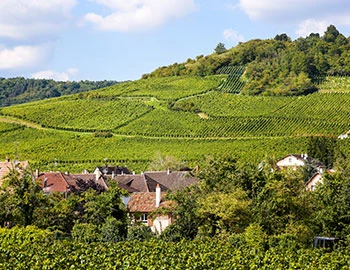
Riesling
The cold-weather king
The Riesling is the flagship of the German wine industry. It grows from north to south in all growing areas. It is also comfortable in the neighbouring Alsace region and in Austria. Its specialty is being vinified to a variety of degrees of sweetness, from bone-dry wines to ice wine. Moreover, thanks to its spirited acidity, it ages better than many reds. The typical Riesling smells of citrus, peach and apricot, shows hints of flint, and with maturity develops an idiosyncratic petrol note. It reflects its terroir like hardly any other white variety. Thus, it often gets fuller and more aromatic in Austria than in Germany. In Alsace, in turn, it has a particular mineral taste. Riesling is a wonderful culinary companion. It fits well not only with fish and shellfish, but also takes the heaviness from hearty meals. And with a fine sweetness and acidity balance, it works wonders for Asian cuisine.
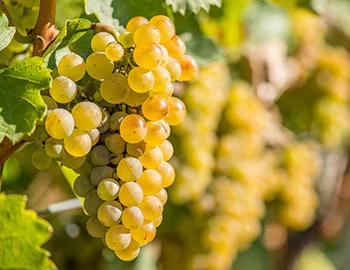
Pinot gris
The aromas of the forest
Pinot gris is, like the Pinot blanc, a colour mutation of Pinot noir. All three have the same genetic profile. On occasion, red, grey, pink and white, berries can be observed on the same vine stock. Some are even striped! The best Pinot grises introduce themselves opulently with ripe peach and apricot aromas, slightly woody notes and a bit of smoke. These characteristics are presented, for example, in examples from Alsace, Grauburgunders from Germany, or the representatives from Valais, where the grapes are erroneously referred to as Malvoisie. In Italy, Pinot grigio from South Tyrol and Friuli win out. Wines from this variety are great culinary companions. They get along superbly with autumnal dishes such as risotto with mushrooms or chestnuts.
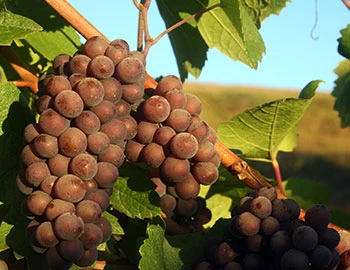
Alsace
Alsace: diverse whites
The exceptional position of Alsace on the border of Germany has contributed to the fact that Alsatian wine culture contains both French and German elements. The range of grape varieties, unusual from a French perspective, is dominated by Gewürztraminer, Sylvaner and Pinot Blanc (Weissburgunder) –varieties all cultivated on the German side of the Rhine in Baden. According to the French tradition, the wines are cultivated and vinified such that they embody their respective terroirs.
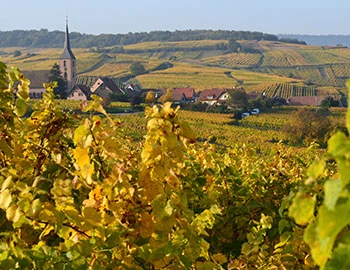
France
France – Philosophy in a bottle
According to French philosophy, wine should be an expression of the soil and climate. They use the word “terroir” to describe this. Terroir makes every wine different, and many especially good. French wine is regarded worldwide as an expression of cultural perfection. The French believe that humans are responsible for the quality of the berries, the vine variety for their character, and nature for the quantity. This philosophy can be expressed succinctly as: “the truth is the vineyard, not the man.”
